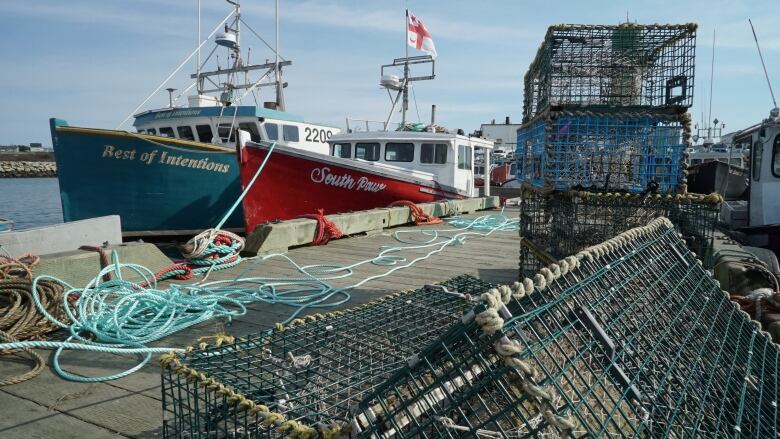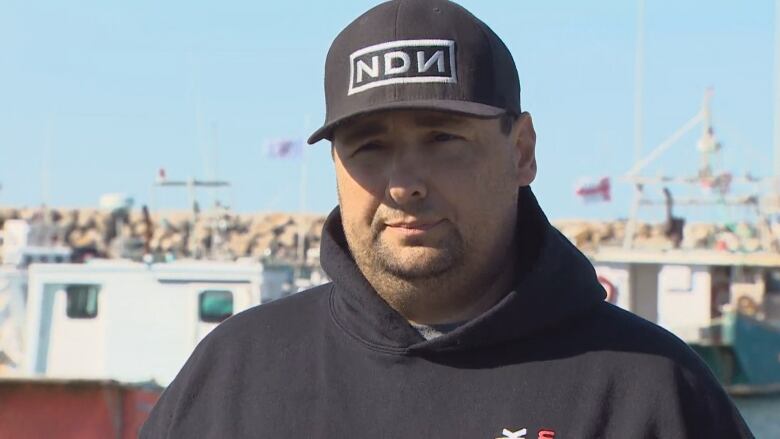Sipekne'katik backs out of commercial lobster season citing fears over safety
'Our people aren't comfortable taking that big risk and especially risking their life for that,' says chief

The Sipekne'katik band will not fish its commercial lobster licences this season in southwest Nova Scotia, citing intimidation and violence that followed the launch of its moderate livelihood fishery in St.Marys Bay.
The decision followed an emergency meeting Fridaywith fishermen working in the band's commercial fishery.
"The consensus is that they don't want to fish in the upcoming season due to concerns of safety. There is also the concern of not being able to sell our lobster," said Chief Mike Sack.
"As of right now, our people aren't comfortable taking that big risk and especially risking their life for that."
Sipekne'katik's decision means band members won't fish the nine lobster licences Sipekne'katik holds in Lobster Fishing Area 34 when the season opens next month.
The First Nation still has the option to lease those licences to non-Indigenous fishermen, whichcould be worth as much as $450,000.

The band's moderate livelihood fishery, which launched last month outside ofthe commercial season,will continue to operate out of the Saulnierville wharf.
Sack saidthe fishery is concentrated in St.Marys Bay and protected by a court injunction to end blockades, interference and threats against community members involved in the fishery.
He saidcommercial vessels that fish farther out to sea are more spread out and vulnerable.
'Co-ordinated and systemic'
In a news release Friday, Sipekne'katik saidit's been the victim of a "co-ordinated and systematic effort of the commercial fishery to undermine and destabilize" its fishery.
Non-Indigenous commercial fishermen and their supporters have reacted with anger and sometimes violence to the fishery in St. Marys Bay, includingswarmingtwo lobster facilities storing Mi'kmaw catches.
Commercial fishermen arguethe Department of Fisheries and Oceans is ignoringits own regulations, which prohibit commercial fishing in areas where the season is closed.
The Sipekne'katik First Nation has saidhundreds of traps belonging to its members have been stolen, damaged or destroyed by commercial fishermen. The bandhasalso said it'sstrugglingto find buyers for lobster harvested under commercial licences it holds in an area of the Bay of Fundy where the season is open.
Rumoured trap seizures
On Friday evening, theAssembly of Nova Scotia Mi'kmawChiefsissued a news releasesayingit has learnedthe Department of Fisheries and Oceans is poised to seize moderate livelihood traps across Nova Scotia.
"Theassembly condemns this action and demands all planned action related to seizure is aborted," the assembly said in the release, which went on to accuse federalFisheries Minister Bernadette Jordan of "acting in bad faithduring ongoing consultations."
"Theassembly is gravely concerned for the well-being and safety of Mi'kmaw harvesters and they are demanding that the harassment ends immediately."
Sack said he'salso been told the department will be removing traps.
In a statement, DFO did not confirm nor deny plans to seize traps.
"There are more than 600 DFO fishery officers working in communities across the country, and the compliance measures they take are based on numerous factors," the department said.
"The minister remains fully committed to working with First Nations in Nova Scotia to implement their treaty rights. These are complex, longstanding issues and the best way to resolve them is through dialogue."
Other bands following suit
Sipekne'katik was the first Mi'kmawband to proceed with a moderate livelihood fishery in Nova Scotia. Since then, at least seven others have said they planto launch, or have already launched, their own moderate livelihood fisheries.
Sipekne'katik said it would no longer wait for the federal government to set the rules for a treaty right recognized by the Supreme Court of Canada 21 years ago.
On Thursday, four inshore commercial fishermen's associations from southwest Nova Scotia issued a news release again calling on federal Fisheries Minister Bernadette Jordan to shut down the moderate livelihood fishery in St. Marys Bay.
They saidthe area is a lobster nursery, and fishing should not be allowed while lobster are breeding and molting there.
Minister responds to commercial groups
DFO said Friday it would "nevermoveforward"with any plans that pose a threat to lobster stocks.
Jordan's office also respondedbluntly tocommercial fisherygroups that havedemandedto be part of the consultations with First Nations on the moderate livelihood fishery.
"The repeated insistence from industry leadership to join the nation-to-nation negotiations ontreatyrights is unconstructive," the office said in a statement, adding that industry leaders have had continued access to the minister.
"The negotiations on moderate livelihood are between the government of Canada and First Nations. The nation-to-nation relationship is a cornerstone of reconciliation, and that will not be compromised."












_(720p).jpg)


 OFFICIAL HD MUSIC VIDEO.jpg)
.jpg)



























































































